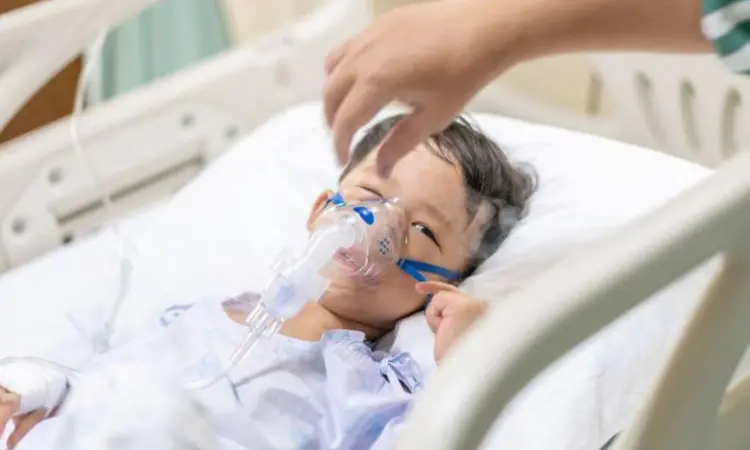- Home
- Medical news & Guidelines
- Anesthesiology
- Cardiology and CTVS
- Critical Care
- Dentistry
- Dermatology
- Diabetes and Endocrinology
- ENT
- Gastroenterology
- Medicine
- Nephrology
- Neurology
- Obstretics-Gynaecology
- Oncology
- Ophthalmology
- Orthopaedics
- Pediatrics-Neonatology
- Psychiatry
- Pulmonology
- Radiology
- Surgery
- Urology
- Laboratory Medicine
- Diet
- Nursing
- Paramedical
- Physiotherapy
- Health news
- Fact Check
- Bone Health Fact Check
- Brain Health Fact Check
- Cancer Related Fact Check
- Child Care Fact Check
- Dental and oral health fact check
- Diabetes and metabolic health fact check
- Diet and Nutrition Fact Check
- Eye and ENT Care Fact Check
- Fitness fact check
- Gut health fact check
- Heart health fact check
- Kidney health fact check
- Medical education fact check
- Men's health fact check
- Respiratory fact check
- Skin and hair care fact check
- Vaccine and Immunization fact check
- Women's health fact check
- AYUSH
- State News
- Andaman and Nicobar Islands
- Andhra Pradesh
- Arunachal Pradesh
- Assam
- Bihar
- Chandigarh
- Chattisgarh
- Dadra and Nagar Haveli
- Daman and Diu
- Delhi
- Goa
- Gujarat
- Haryana
- Himachal Pradesh
- Jammu & Kashmir
- Jharkhand
- Karnataka
- Kerala
- Ladakh
- Lakshadweep
- Madhya Pradesh
- Maharashtra
- Manipur
- Meghalaya
- Mizoram
- Nagaland
- Odisha
- Puducherry
- Punjab
- Rajasthan
- Sikkim
- Tamil Nadu
- Telangana
- Tripura
- Uttar Pradesh
- Uttrakhand
- West Bengal
- Medical Education
- Industry
22 Percent of Indian Children with Diabetic Ketoacidosis Develop Kidney Injury, Reveals Hospital-Based Study

India: A recent study published in Apollo Medicine highlights a concerning complication in pediatric patients with diabetic ketoacidosis (DKA)-the development of acute kidney injury (AKI). Conducted by Dr. Satish Tadakanahalli and his team from the Department of Paediatrics at SDM College of Medical Sciences and Hospital, Shri Dharmasthala Manjunatheshwara University, the study found that nearly 23% of children admitted with DKA developed AKI, significantly prolonging their hospital stay and delaying recovery from metabolic acidosis.
The retrospective analysis reviewed medical records of children under 14 years admitted with DKA between 2021 and 2023. Of the 31 cases studied, 7 children (22.6%) developed AKI. The study aimed not only to identify the proportion and predictors of AKI in this population but also to assess its impact on clinical outcomes such as hospital stay and resolution of acidosis.
Speaking to Medical Dialogues about the motivation behind the study, Dr. Tadakanahalli shared, “We had a case of DKA in a child who developed AKI severe enough to require dialysis. That experience prompted us to explore the prevalence and predictors of AKI in children with DKA. The available literature showed wide variation in incidence, so we wanted to better understand the situation in our setting."
The study found statistically significant differences in clinical parameters between the AKI and non-AKI groups. Specifically, age, body mass index (BMI), corrected sodium, and blood urea levels were notably different. Children who developed AKI had a longer median hospital stay of 10 days, compared to 6 days for those without AKI. Similarly, time to resolution of metabolic acidosis was longer—96 hours versus 39 hours.
Commenting on whether the 22.6% incidence was surprising, Dr. Tadakanahalli noted that the proportion varies widely across studies and regions, ranging from 7% to as high as 66%. “One of the key reasons for this variability is the difference in criteria used to define AKI. For instance, using urine output as a criterion can be problematic in DKA due to various confounding factors. Also, the proportion of new-onset diabetes cases in each cohort can influence AKI incidence, as new-onset DKA is generally associated with lower rates of kidney injury,” he explained.
When asked which predictors clinicians should pay attention to, he emphasized that corrected sodium and blood urea levels were indicative of the severity of dehydration, which is a major risk factor for AKI. Age and BMI were also statistically significant in their analysis. “Children presenting with severe DKA should be closely monitored for renal function, especially if these parameters are abnormal,” he advised.
To minimize adverse outcomes such as prolonged hospitalization and delayed recovery, Dr. Tadakanahalli stressed the importance of early recognition and timely management of AKI. He recommends that pediatricians adhere to established protocols, especially the International Society for Pediatric and Adolescent Diabetes (ISPAD) guidelines for fluid correction in DKA.
“The key takeaway for clinicians managing DKA is to identify dehydration severity early, monitor kidney function proactively, and intervene promptly if signs of kidney injury are present,” he concluded.
The study underlines the need for greater awareness among pediatricians and emergency physicians treating DKA, particularly in resource-limited settings where delays in recognizing AKI can significantly impact recovery and outcomes.
Reference:
Chaukimath, S. S., Tadakanahalli, S., & Badiger, S. Acute Kidney Injury in Children Admitted with Diabetic Ketoacidosis. Apollo Medicine. https://doi.org/10.1177/09760016241302948
Dr Kamal Kant Kohli-MBBS, DTCD- a chest specialist with more than 30 years of practice and a flair for writing clinical articles, Dr Kamal Kant Kohli joined Medical Dialogues as a Chief Editor of Medical News. Besides writing articles, as an editor, he proofreads and verifies all the medical content published on Medical Dialogues including those coming from journals, studies,medical conferences,guidelines etc. Email: drkohli@medicaldialogues.in. Contact no. 011-43720751


